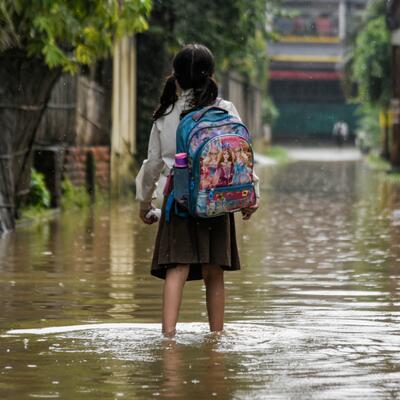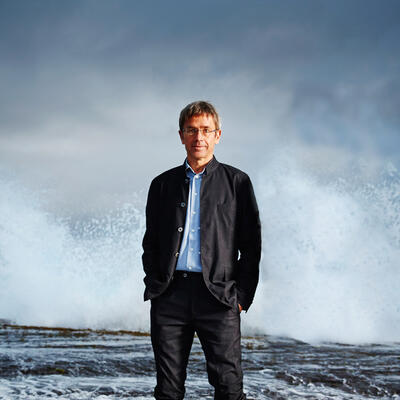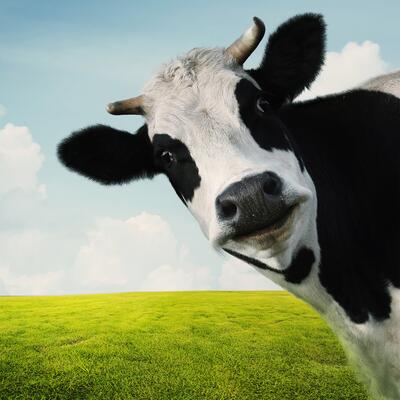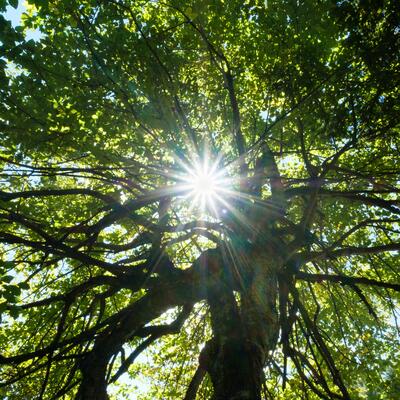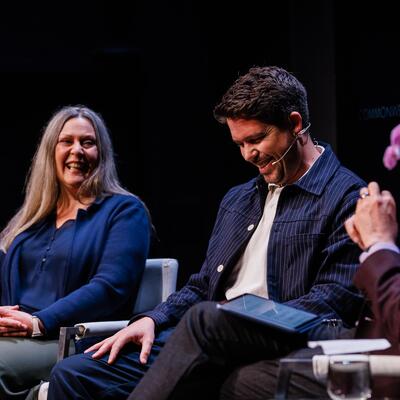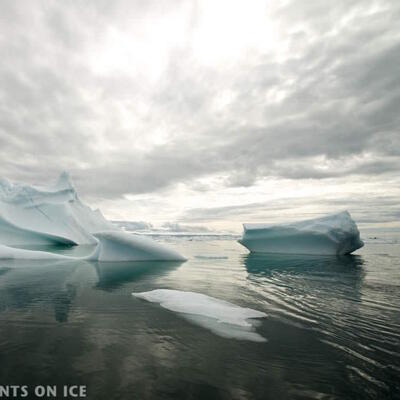
Deep Dive Into the Arctic
Summary
Climate One goes to the front line of climate change - the high Arctic - to hear from the people there how their economies, communities and culture are changing due to global warming.
Nancy Karetak-Lindell, President, Inuit Circumpolar Council Canada
Catherine McKenna, Canada’s Minister for Climate Change
Pascal Lee, Planetary Scientist, NASA’s Mars Institute
Brendan Kelly, Former White House Scientific Advisor
Kuupik Kleist, Former Premier of Greenland
Danko Taboroši, Director Coral and Ice
This program was recorded during a Students on Ice trip to the Arctic in August of 2017.
Image courtsey: Martin Lipman, Students on Ice
Full Transcript
Announcer: This is Climate One, changing the conversation about energy, economy and the environment.
On today’s program, we travel to the Canadian Arctic to hear from the people there how their economies, communities and culture are being affected by climate change.
Nancy Karetak-Lindell: Our lakes are thawing out sooner. We have the sea ice freezing later. We have someone like our elders who knew so much about the land. And because of climate change they no longer trust that knowledge. It's shaky.
Announcer: On the front line of climate change, the Inuit of the high Arctic – together with scientists, educators and policymakers – are fighting a battle for their homeland against a threat that ultimately connects us all.
Catherine McKenna: And we had an Inuit elder talking to a leader from a small island state. The Inuit elder said, “How sad is it that my homeland is melting and it's flooding yours.”
Announcer: Taking a deep dive in the Arctic. Up next on Climate One.
Greg Dalton: This is Climate One. I’m Greg Dalton. In 2007 I went to the Arctic on a Russian icebreaker to learn about global warming. That trip inspired me to found Climate One and now ten years later, I’m back in the Arctic to reconnect with the beauty and learn more about the top of the world. This time I’m traveling on a cruise ship with scientists, educators and and more than a hundred high school students from Canada, the United States, and other countries. The trip was organized by Students on Ice, a Canadian educational group dedicated to learning about the Arctic and the indigenous people who live there. They used to be called Eskimos, and now prefer to be called Inuit. Our group included many Inuit elders and students, offering me much more cultural contact than my first Arctic adventure.
Our journey began in earnest when our charter plane landed on a dirt runway about three hours north of Toronto. One of the first things I saw in the tiny airport terminal was an Australian cattle dog.
Pascal Lee: He’s our polar bear guard dog and it’s wise at a camp like this in the middle of nowhere in the Arctic to have more than just shotguns if there’s a polar bear incursion.
Greg Dalton: Pascal Lee is a planetary scientist with NASA’s Mars Institute in Silicon Valley.
Pascal Lee: First of all, the dog might detect the bear ahead of time from smelling it. And then it can actually intimidate a bear and, you know, make the bear go in circles rather than to attack and buy some time for example. But anyway, it’s still theory because King Kong has not met a polar bear yet but --
Greg Dalton: It makes you feel safer knowing he’s here.
Pascal Lee: But we all have this warm fuzzy feeling that he would be a help if there was a polar bear.
We come every summer to Devon Island in the high Arctic just east of Resolute Bay. Because it’s one of the most Mars-like places on earth. And the landscape looks like Mars, the climate is cold and dry, a bit like Mars. And when you visit Devon Island today, Devon being the largest uninhabited island on earth. When you visit Devon Island today you sort of catch a glimpse of what Mars was like earlier in its history when there was more ice at the surface, more water flowing. The canyons on Devon Island, the gullies that you’ve seen, the canyon walls, there’s even a giant meteorite crater that we go visit. All of these things make the place incredibly Mars-like.
Greg Dalton: How is climate change affecting Devon?
Pascal Lee: So climate change is affecting Devon in a significant way because there’s actually an ice cap on the eastern half of Devon Island. It used to cover the entire island but with glacial retreat over the past centuries, now half of Devon is exposed there’s no more ice on it. But the other half still has ice but it’s ice is receding quickly especially with global warming. When we explore Devon Island, we are still using some air photos that were taken from the sky in the 1950’s. And when we go to the same locations today where there was ice in the 1950’s there’s no more ice, there’s barren ground. So in just a few decades we’re seeing a significant change in the amount of ice free ground that is exposed now on Devon Island.
Catherine McKenna: For Inuit here, ice is life.
Greg Dalton: Catherine McKenna is Canada’s Minister of Environment and Climate Change. She was on the journey with her two daughters.
Catherine McKenna: Ice is how people connect to each other so if there's less the time in between, you know, seeing people is much longer but also ice is hunting, ice is relationships between elders and young people when they go on the land and hunt. Ice is dogs.
I remember one Inuit I met he was talking about a hunter in the village who went on the ice and was for, you know, for decades had been able to tell the thickness of the sea ice. But because of the changes wasn't able to do that and fell in. And, you know, think about that. So you lose a father, you lose an uncle, you lose someone who provides food for the family. You lose a connection to culture and history. And I think that other people telling those stories and, you know, if you're a farmer in Saskatchewan having a farmer in Saskatchewan talk about the changes that they're already seeing with droughts and floods and how that's impacting the crops that they can plant. I think that that's really important.
So what I try to do is I go seek out people who can tell or talk in a very real and compelling way about how climate change is really impacting their lives. Because I think that's the connection that you make. It’s great if that person is someone that you can directly relate to, but at least it's telling someone about a story and it’s direct and it’s immediate. Becuase we know climate change is real and it's having impacts, not just in the high Arctic. It’s having impacts across Canada we know that and across the world.
I also think there's also interesting, making the link between different places. So when I was at Cop22 this year in Morocco we had a reception. And we had an Inuit elder talking to a leader from a small island state. And there was just this one moment where the Inuit elder said, “How sad is it that my homeland is melting and it's flooding yours.” And that's reminding people that we’re all connected and that's why we all have to act on climate change. It's not this like well should we do our part because other people aren’t doing their part. We all have to do our part and we all have to step up. And, you know, we all have to lead and then we will all be able to make progress on a really challenging issue and we all know we have to be more ambitious but you got to start somewhere.
And that's why I think, you know, international negotiations are important. I think the Paris agreement is really important. But getting people to act locally to look at, you know, to demand net zero houses or better access to electric vehicle charging stations or public transit. I think that's all part of the puzzle.
Greg Dalton: I talked with one Inuit youth about oil extraction in the Arctic. The warming is making resources more accessible. Some people worry about a resource rush among the Arctic nations, Canada, Russia, U.S. What are your thoughts about the economic opportunity of oil extraction in the Arctic and yet moving toward carbon free economy?
Catherine McKenna: Well I mean we always say the environment and the economy go together. And I think they go together in a practical way in a real way in the sense that you can't just talk about the environment without thinking about the benefits that we all take out of it, and there's a value on that. There's a real economic value.
But there's also a practical way. When you talk to people who live in communities here often, you know, they're poor. They don't have a lot of opportunities and so they need to be part of that conversation about how or whether we develop. I think there are places that you should not have resource development. I think you need Marine conservation areas, you need protected areas. I think those are like extremely important. If there was a spill in a place like some of the places that we’re traveling through right now it would be absolutely devastating.
Greg Dalton: We were riding in a Zodiac yesterday along a glacier and it was interesting moment. There are 10 people in the Zodiac, people were very quiet. You were there with your daughter. I'm just curious what you were thinking about looking at that beauty of that glacier as we are riding in that Zodiac.
Catherine McKenna: I mean, I guess in my job I always think about the impact of my decisions and how do I in my small or big way, you know, try to make sure that that glacier is still there, you know, in decades, in centuries. And, you know, you can only do your part, but it is very real here. There's no abstracting that, you know, the decisions we make as a government will have an impact on what we care greatly about in our natural beauty. I also thought I'm responsible for parks and protected areas and really making sure that Canadians have an opportunity even if they can't come up here. It's a challenging place to get to; in fact you probably don't want everyone coming up here. But how do we show people these places because I don't know that Canadians understand how incredibly diverse and beautiful our country is. And I want -- luckily we have new technologies, you know, there are drones there are ways that you can actually create a virtual-reality experience. So even if you can't come up here you can see these places and you can feel the connection. Because I think people make decisions based on connections. You get the hard facts, but probably in the end when you're gonna make some decisions, you know, it’s gonna be because you care about your kids. Like I look at my daughter on the boat with me and I think like this, you know, decisions that I'm making it's about future generations more than anything else.
Announcer: That was Catherine McKenna, Canada’s Minister of Environment and Climate Change. We’ll hear more voices from the Arctic, right after this. This is Climate One.
Greg Dalton: Welcome back. I’m Greg Dalton, and on this special Climate One program we’re taking a deep dive into the Arctic, with some of the people that I met on my recent trip to the top of the world.
While many carbon-conscious people worry about the impacts of climate disruption on future generations, in the Arctic those impacts are being felt today. The Inuit and other indigenous people in the region live off the land and their humble lifestyles generate tiny carbon emissions. I asked one of the Inuit leaders how she felt about the fact that those who contributed least to the problem are being hit first and worst.
Nancy Karetak-Lindell: Well there has been many unfair things that have happened to us that we have had no control over and, you know, this is one of them too.
Greg Dalton: Nancy Karetak-Lindell was referring to colonization of the arctic by European and Canadian settlors. She was the first Inuit woman to be elected to Canada’s Parliament. She now is president of Inuit Circumpolar Council Canada, a nonprofit organization that represents approximately 160,000 Inuit of Alaska, Canada, Greenland, and Russia.
Nancy Karetak-Lindell: I think we are one of the most adaptable people in the world. We live in a land of extremes, extreme cold, extreme hardships. And so we have had to learn to be resilient and adaptable. But in this time where we are not isolated from the rest of the world anymore, when I grew up my community had no telephones we had no TV and we had no flights that people regularly got on to visit another community. I didn't leave my community until I was probably 13. And my life was just my community. That's all I knew.
And yet today, I can go on the Internet and show my mother all the different pictures people are posting on the Internet. She watches, love nature. She knows more about the jungles and the animals just from watching because she doesn't speak or read English. And so we’re now living in a world where we can see what's happening in the outside world. And then realize that our world has expanded beyond our communities. 25 communities in Nunavut and none of them are accessible by land. We have no roads going into the communities, we fly in, we fly out.
And we can get to each other by boat in the summer time. Our communities we can go by snowmobile but travel by air is the only way that we can travel commercially.
And so we realize now that what happens outside of our communities touches us in different ways. And unfortunately one of those is climate change, you know, the pollution that we see on TV, factories spewing smoke into the air, a mine somewhere where the effects of that.
Something happens in Russia, it goes up into the sky and falls down on our side.
Something that happens in a land thousands and thousands of miles away could be on the other side of the world from us does have an effect on my land, my water, the sea, the animals. And we need to bring that awareness to the world but we’re very small communities; some communities have 200 something, 300, 400 to 500. The bigger ones maybe a thousand people. My community has 2,500. We don't have the numbers to force the world to do something, but we can have a voice which was again something we didn't have in the past, either.
Greg Dalton: One thing we've heard on this trip is how people of the Pacific islands are suffering consequences of rising seas caused by melting in the North. And those are very different parts of the world. So I'm curious if you have any insights thinking about the connection between the melting in the north islands and the impacts on the Pacific islands. We have some people on this journey, who are from Micronesia, Palau, et cetera.
Nancy Karetak-Lindell: Yes, well I just saw a presentation on that and listening to someone from Micronesia talk about the locals there. They are so similar. They live off the land, they use their knowledge to try and combat some of the changes affecting their communities, which is exactly what we’re going through. And what we want is recognition that our indigenous knowledge has a role to play along with the scientific work that is being done. And I was told that when our glaciers melt and the sea level rises that those islands are going to be affected that they're going to be no longer an island, it could be I guess and that someone's home.
And that impacted me so much knowing that as much as I live in a land of ice and snow and live my life, there’s someone else in a very hot country feeling the same changes to their environment caused by something in my area.
So again I keep telling the students, awareness -- as someone said, educate yourself find out more. And I always say put a human face to the situation. You're going to meet people from this area. When you hear about the Arctic you're going to be able to visualize the people. And it's a lot harder to just disregard hearing something when you know the people and can picture their face and their families. And it becomes a human issue.
Greg Dalton: One thing that’s happening in your communities is there's a lot of challenges for youth, lots of challenges among the youth having depression even suicide. And climate change brings uncertainty and stress and worry about their future. How is that affecting our already difficult situation of youth despair?
Nancy Karetak-Lindell: I think it would be that there has been so much change in our lives. Inuit people lived for so many years in the same environment without changes, very minimal changes. And then in the last 50 to 60 years, we have seen tremendous change. And no society can go through that much change and not suffer social consequences.
And so, I tell people my history is right behind me. My father was a special constable with the Royal Canadian mountain police. And I'm not that old, but I remember feeding the dogs with him because that's how he patrolled. And we traveled by dog team. We had no telephones. We had no television.
So that's tremendous change. But that's not counting the changes that we've gone through as people. We had our own governance system. We had leaders, we had a way of seasonal living. We’re very seasonal people. We travel depending on the season and where. And we still do that to a certain extent. But now we live in communities and not everyone has a hunter in their family. We live within laws and a justice system that we’re still trying to adjust to.
And so climate is just one of those changes and it creates its own challenges. Our lakes are thawing out sooner. We have the sea ice freezing later. We have different species coming in. We have someone like our elders who knew so much about the land; how to predict the weather, what conditions they will see. And because of climate change they no longer trust that knowledge. Like everything they have been taught is now losing its foundation. It's shaky. Do I teach this to my grandchildren now, when it might not be relevant today? Because I could say this is how the weather's going to be tomorrow based on the clouds, the sun, you know, what I see in the sky. But they have to give a disclaimer now and say because the conditions are so different now I can tell you this is how it should be tomorrow. But I cannot say this is how it will be tomorrow.
So that changes people too. People who have been so grounded in their own knowledge all of a sudden their ground has shifted and they’re no longer quite sure what points of our knowledge do we pass on. We have to keep adapting to and making new knowledge to pass on because our foundation is changing too.
Greg Dalton: Nancy Keratak-Lindell is a former member of Canada’s parliament. She now is president of Inuit Circumpolar Council Canada.
We're listening to Celina Kaluk and other Inuit singers, performing at the community center in the village of Resolute, Canada.
As I traveled on a cruise ship around the arctic with scientists, educators and high school students, I kept hearing the phrase - What happens in the Arctic doesn’t stay in the Arctic. Brendan Kelly was a scientific advisor in the Obama White House and now is an Arctic expert with the Middlebury Institute of International Studies. He explained why people outside the Arctic should care about it, and what’s happening to science under the Trump administration.
Brendan Kelly: If you think of the Arctic Ocean as being ice covered for most of the year and it is this, it’s a continental sized mirror if you will, reflecting the sun’s energy back to space. So that's solar energy that’s not heating up the Arctic. But as we’ve warmed through our greenhouse gas emissions, the planet, we began to melt the ice and diminished the area covered by ice.
When you do that, you go from having this highly reflective mirror, snow and ice are among the most reflective natural materials on earth. So that area it starts being increasingly an open ocean and that actually absorbs the vast majority of solar energy. So you start warming up the Arctic Ocean. So you melt more ice, so you have less reflectivity. So you warm-up the ocean and you get the sort of runaway effect.
What is this have to do with people living in lower latitudes? Well, several things. I mean we’re beginning to have such a change in the Arctic Ocean that we’re changing oceanic currents. The distribution of heat around the planet is to a large degree driven by the circulation, oceanic circulation. And as we change the temperature and the salinity and density of Arctic sea water, the water that comes out through this portion of the Arctic we’re in right now, that Arctic water typically sinks into the less dense North Atlantic Ocean and really is from the engine if you will that drives the global ocean circulation pattern. So that's one way. But the other thing that is a hypothesis it's gaining good support is that we see a substantial change in atmospheric flow. So if you think of the warm upper atmosphere over mid-latitudes and the relatively cold upper atmosphere in the Arctic there's a differential, right. And air actually flows from this high warmer air in the mid-latitudes down to the coal error in the Arctic. And as it does so, Coriolis Effect spins that air and you end up with this rapidly moving West to East flow in the upper atmosphere. It’s called the jet stream, right.
But as we've shrunk sea ice in the Arctic now you've taken sort of the lid off the ocean and the ocean is in direct contact with the atmosphere. Heat is escaping from that ocean into that atmosphere. So we’re now warming the atmosphere in the Arctic as well. Hence, we’ve decreased the differential between the temperatures in the atmosphere of the mid-latitudes and the Arctic; that slows down that northward flow, ultimately slows down the jet stream. And the jet stream starts to like a slowly moving river begins to meander and it starts to have large waves in it. And those ripples to things like you get this big trough coming down along the East Coast of the United States and Canada and we end up pulling cold air out of the Arctic and having these severe winters with massive snowstorms that happened several years recently along the East Coast of North America. There’s some evidence that those changes in the jet stream have been blocking for a number of years Pacific flow into the West Coast of the United States. Hence, this six year drought we had in California.
You know, my colleagues who sort of advance this connection between sea ice loss, and extreme weather and mid-latitudes, you know, they've received some pushback by other colleagues who are more specialists on low latitude weather. They say, well, you know, there are all these other complicating factors.
So without going into all of the details this debate, right now my sense is that what those scientists are trying to work through is we see a very plausible mechanism by which loss of sea ice is changing, of course there are other influences. So it’s really a matter of trying to sort out the degree. But if you think about it, this is a fairly recent phenomenon. The model suggests this is a very plausible mechanism. But we don't have much of an observational record yet. We have just sort of changed to this new sort of normal if you will. So it’s gonna take a few years to really confirm or refute that hypothesis.
Greg Dalton: You worked on science policy in the Obama White House. A lot of your colleagues have left. Tell us what's happened to the brain trust of science inside the White House and the new administration.
Brendan Kelly: Well, so when I left there the office of science and technology policy which is headed up by the president’s science advisor had something like 130 people there. There's about 35 left and declining as we speak. There is no, the current administration has not appointed a new science advisor. And this is troubling because that office has a lot of influence on A, keeping the president apprised of the kind of current state of science and technology across many fields.
And, you know, there are a host of issues, climate change being one of them where it’s really the president has a lot of influence on how money gets spent, what our priorities are and research. So it's quite troubling. We’re still in touch those of us who worked on that issue and we’re, but we’re all working in different venues now and, you know, trying to see the things that were in our portfolio that were really important continue.
Greg Dalton: Brendan Kelly was a scientific advisor in the Obama White House and now is an Arctic expert with the Middlebury Institute of International Studies. It can be troubling watching the Trump administration dismantle scientific efforts to manage the risks of climate change. I asked Catherine McKenna, Canada’s Minister for Climate Change, how she views American obstruction to dealing with a problem that nearly every other country in the world has agreed to tackle.
Catherine McKenna: So I've always been an optimistic realist. So hard things are hard. So this is really hard but I think you only get to a good place if you bring people together. And I don't think you bring people together around despair. I do point out that, you know, you have specific climate events like in communities, people are seeing flooding, they’re seeing drought so it connects to them. Like they remember oh yes, that flood, that was terrible and very scary and worrying. And if we see more of those which we will they get that connection. But I think it's also the hopeful piece that we’re smart. Like we’re able to come to a very harsh country and survive and thrive. And so, let's just take that spirit and really figure out how we can make the right decisions, big decisions and small decisions, and all be part of it.
And I really have always said this that I am a minister of environment and climate change for environmentalists sure, but also for people who are in the energy sector. And we have to figure this out together. And I also am very aware that if I don't get it right, if I don't figure out how to bring people along. I won’t get reelected. And how does that help us, because, you know what you might get a party that doesn't care about climate change, God forbid they don’t believe it’s real. But I think in Canada luckily we’re in a pretty good spot. But we need to be mindful that this is about people and people are also just trying to get through the day. They're trying to get food on the table maybe take their kids to their activities after school. So they want to be part of this conversation. And Canadians actually really value the natural environment, but we need to make it so that they feel like they're empowered to make decisions. And just feeling like it's too big and you can’t make decisions and it’s not gonna matter is not gonna get us anywhere.
And so I will continue to push though. I know young people in particular will continue to push me which is great. You need to be held to account and you need to always be reminded that we need to be more ambitious. But I think that there's a way of going together. I was really proud when the Prime Minister was with the premieres from all the provinces and territories and indigenous leaders and stepping up and announcing our climate plan. That took a lot of work. That was like the post Paris work, you know, went to Paris got an ambitious agreement within Canada we’re resource-based economy still and everyone has to play a piece in it. The government of Alberta really stepped up; it was a new government put a hard cap on emissions from the oil sands a price on carbon, phasing out of coal. And that was really important because everyone, you know, that set the stage, you can’t have a climate plan without, you know, the province that has the largest emissions being part of it. And so we came together in Canada and I think we can do more and I'm gonna continue talking to everyone I can and cajoling people, pushing people, jamming people, encouraging people, being pushed myself to get to a better place.
Announcer: You’re listening to a special Climate One program from high in the Arctic. You can listen to all of our programs and subscribe to our podcast at our website: climate-one-dot-org. We’ll be back with more right after this.
Greg Dalton: This is Climate One, changing the conversation about energy, the economy and the environment. On the show today we are hearing conversations I recorded traveling around the Arctic on a ship with students and scientists.
The warming Arctic is an alarm bell for the rest of the world but it also does open up new economic opportunities in the region. More tourism, mining, oil drilling, and new shipping routes through the fabled Northwest Passage are enticing to people who would like to see more economic development and jobs.
Kuupik Kleist: I’m Kuupik Kleist, former premier of Greenland.
Greg Dalton: Kuupik Kleist now works as a consultant for the Inuit Circumpolar Council. His focus is developing and diversifying the Greenland economy to lessen its dependence on the fishing industry. I asked Kleist what the opening of the Northwest Passage could mean for Greenland’s economy.
Kuupik Kleist: I would say that we are not sure of the consequences yet. But we have seen some of the big shipbuilding nations actually building cargo ships suited for that kind of transportation. Whether it will in the end contribute to our economy that’s uncertain yet. But definitely sailing through Arctic water also holds some risks still because even the sea ice is disappearing. We have a lot of icebergs deriving from Arctic glaciers. And also in terms of what we are dealing with actually with the ICC commission on the North Water polynya is that it disturbs the wildlife. And also it disturbs the environment that the wildlife is dependent on. In terms of sea ice for instance, if icebreakers would break up the ice it will dramatically change the environment the different species that are living in.
And actually the North Water polynya is proved to be providing wildlife for not only the area but a big part of the Arctic seas actually. And it's the most productive polynya in the Arctic and by that the most important marine area. And for Inuit living on both sides, in Greenland and Northern Canada, I think it's fair to say that it's vital for the lives of the communities. It’s vital for the countries’ economies based on living resources. And also it holds, it bonds us together culturally and the ways that we are living.
Greg Dalton: One large cruise ship went through the Northwest Passage got lots of attention. Do you see the prospect for tourism, new docks, hotels, that kind of economy?
Kuupik Kleist: Actually that’s been one of the issues which caught a lot of interest to discuss during our communities consultations in the Northern Canadian villages, especially because of that cruise ship. What people said basically was in the small communities, when a ship that magnitude arrives with several hundred people maybe a thousand people and arriving to a village with maybe 100 people, they cannot cope with it.
Because those tourists are, even though officially they’re welcomed but what they do to small villages is that -- for instance one story was about they had this arrival and the tourists actually emptied the convenience store for the goods which they only get once a year. And after the summertime they were worried, how do we survive next winter if we don’t get new supplies for the convenience store. And also cruise ship tourists are those giving away the less money ‘cause they live on the ships, they sleep on the ships, they eat on the ships and don’t leave much money when they leave the villages. So on one hand there is a definitely there is a wish for developing tourism and generally in the Arctic. At the same time you need to be aware which kind of tourism that you are promoting. And maybe cruise ships is not the answer.
Greg Dalton: Yesterday we were in Ilulissat and that's a very active glacier and fjord that puts in a small amount of global sea level rise every year. But the Greenland ice sheet is very concerning to scientists. They’re not sure how fast it's melting and that's potentially a big ticking time bomb for the global civilizations.
Kuupik Kleist: Actually also yesterday we looked at the newest satellite images of the melting of the ice cap. And it proves that a much bigger part of the ice cap was actually melting away except for the core in the middle of the ice cap. It contributes, of course significantly to sea level rise, but for Greenland, I mean Greenland is a mountainous country; we all live like 100 feet above sea level. It wouldn't have that kind of serious consequences. But what it has done while retreat of glaciers is going on is that there is a new and stronger interest in searching for minerals on land in Greenland. And maybe also with it goes the disappearance of sea ice which means easier transportation. Transportation is a key issue. You can take out the minerals of the ground, but if you can't transport it to the markets, it gives no sense. So that goes together. But then again, the world market has been behaving negatively on mineral resources for the last decade prices have been going down. Now it seems there are more positive tendencies but so far in Greenland it has had no significant impact.
Greg Dalton: And how about the, I don’t know, the almost psychological aspect of this beautiful area of your country, you know, is melting and of deep concern. And yet you can’t control it but it’s happening in your backyard. And in some sense, the future of coastal communities around the world are connected to the melting that’s happening in your homeland.
Kuupik Kleist: It’s very visible. I mean, you can look out your window and see it’s really happening. I mean in comparison to the kind of hypothetical discussions we have around the world, is climate change going on or not. In Greenland there’s no question, it’s a fact that you can see with your bare eyes.
I was born and raised in this area. And some years ago, maybe 15 years ago when I, for the first time realized what was going on and I was an adolescent. Usually we would see the icebergs breaking from the glacier actually being higher than the small hills in the town. And you could see it from long distance. But suddenly that year I couldn’t see the icebergs anymore because they had grown smaller. And the ice cap has retreated like for more than 20 kilometers which means that when the ice breaks off the glacier, it’s falling on the ground. Before that it fell out to the sea so it was, it was not destroyed by breaking off. I must admit I was really shaky with that experience because to me those icebergs was like mountains. It’s always there, it will not disappear in front of your eyes. So psychologically I think in Greenland we’re all aware of what's happening. And also we are worried because it’s beyond our control. And it does things to the environment which we cannot predict and the weather conditions and being dependent on living resources. This is very serious.
And for instance, now we are in the northern part of Greenland where dog sledding or sleds dogs are allowed, it’s not allowed below 60 degrees. So what happened to the dog sleds is in comparison to how many dogs we had 20 years ago. Now it’s a half the number because the hunters cannot go dog sledding on the ice anymore. So you don’t need the dogs for fishing or hunting. So they get rid of them because otherwise they have to feed them and cannot afford that. So every aspect of society is impacted by climate change and it's really hard sometimes when you go to meetings internationally that you have to sometimes be involved in silly discussions on is climate change really going on. And I mean, to us, it seems most insulting and also a kind of waste of time, rather than discussing issues related to how to adapt to the new situation and how to protect the communities and the livelihoods of the Arctic Inuit despite the climate change.
Greg Dalton: Kuupik Kleist is a former premier of Greenland.
People from all over the world were along on the voyage, which gave us the opportunity to understand how climate change connects us all. Islands far away from the Arctic are impacted by what’s happening there. Danko Taboroši runs a program called Coral and Ice that connects the people of the Arctic with people in Micronesia. He brought three students from the Pacific Islands to see the melting Greenland Ice sheet that is contributing to the rising seas that are threatening their homes thousands of miles away.
Taboroši left war-torn Yugoslavia when he was a teenager. After studying in the United States and Japan he landed in Guam, and carries a deep empathy for displaced people.
Danko Taboroši: It really changed my life, you know, for many reasons. In Guam like everyone is different people from all over the U.S., all over Asia, all over the Pacific, lots of indigenous people lots of mixed people.
It was just such a kind of a treasure house of culture, human culture that just from there like my love for the world exploded. I wanted to see everybody I met, I wanted to see where they come from and that actually took me to Micronesia. And to this day like my life is connected with Micronesia. Pretty much everything I do professionally and also out of love I do a lot of projects with no funding and it's all related to Micronesia to the island's physical geography or human culture, languages, education, everything, yeah.
Greg Dalton: You felt like you lost a country, but you gained the world.
Danko Taboroši: You know, I think even as a child I was very curious about the world, you know, but I couldn't, I think we’re all are very much kind of trapped in the mental borders of our countries, you know, and the limitations of one single language or, you know, what you see around you. And I really don't think that I would've been, I think I would become some sort of citizen of the world no matter what. But totally losing a country just gave me no choice. I had to kind of go all the way. Yeah, I have a passport from that country but I really, it's not the same place.
I could have worked with students and has to bring people from, students from the former Yugoslavia. But that’s not what I worry, that’s not where my, you know, that’s where I’m from. And I love that region as well but like right now I don't think there is a place in the world that is more threatened than that, you know.
Like the Arctic is really severely challenged by climate change, but in Micronesia the land is literally being washed away underneath people's feet. And there is a lot of hope, you know, these are complex systems, these islands, the coral reefs are very complex. So it's not all black and white. It’s not certain of what’s going to happen. But it's clear that what is happening has never happened before in living memory. And I have seen way too many places where people will point on the reef or water and say like I was born like in that spot and there is no land there. And I want to help the young people in Micronesia connect with people who are going through similar climate change issues in their own communities, particularly in the Arctic. So as they’re growing up, they’re aware of each other, they’re in contact with each other. Someday they will be the governments of their respective territories or countries. And I hope that by giving them this opportunity while they're young, it will enable them to be much more powerful and their voice is stronger when they speak out together against the causes of anthropogenic climate change.
Greg Dalton: What's been their experience connecting with Island people up here?
Danko Taboroši: Each one of them have Inuit roommates. I think they are getting along very well. And they're seeing what I was seeing and that is really similarities in culture, you know, like these are young students. They’re not focused on one issue like the climate change. They’re looking at all sorts of things; everything they see here is new. And it's interesting that they're pointing out like even something as exotic to them as a seal.
You know, and like seal meat hunting for seals actually has an like equivalent like, whoa, that’s just like our sea turtles. You know, they’re endangered but we still love them, we still eat them, they’re part of our culture and we know how to sustainably manage the fishery, the resources and it's similar. So I wanna say basically that in every thing they see here. I think they’re enjoying and seeing something new. And they’re subconsciously or consciously connecting in with something they know from home.
Greg Dalton: Throughout this program, we’ve been listening to the music of Ian Tamblyn and sounds from the Arctic recorded by participants of the Students on Ice expedition. Photos of our arctic journey are on the Climate One facebook page.
Thanks for listening. We’ll see you next time.
